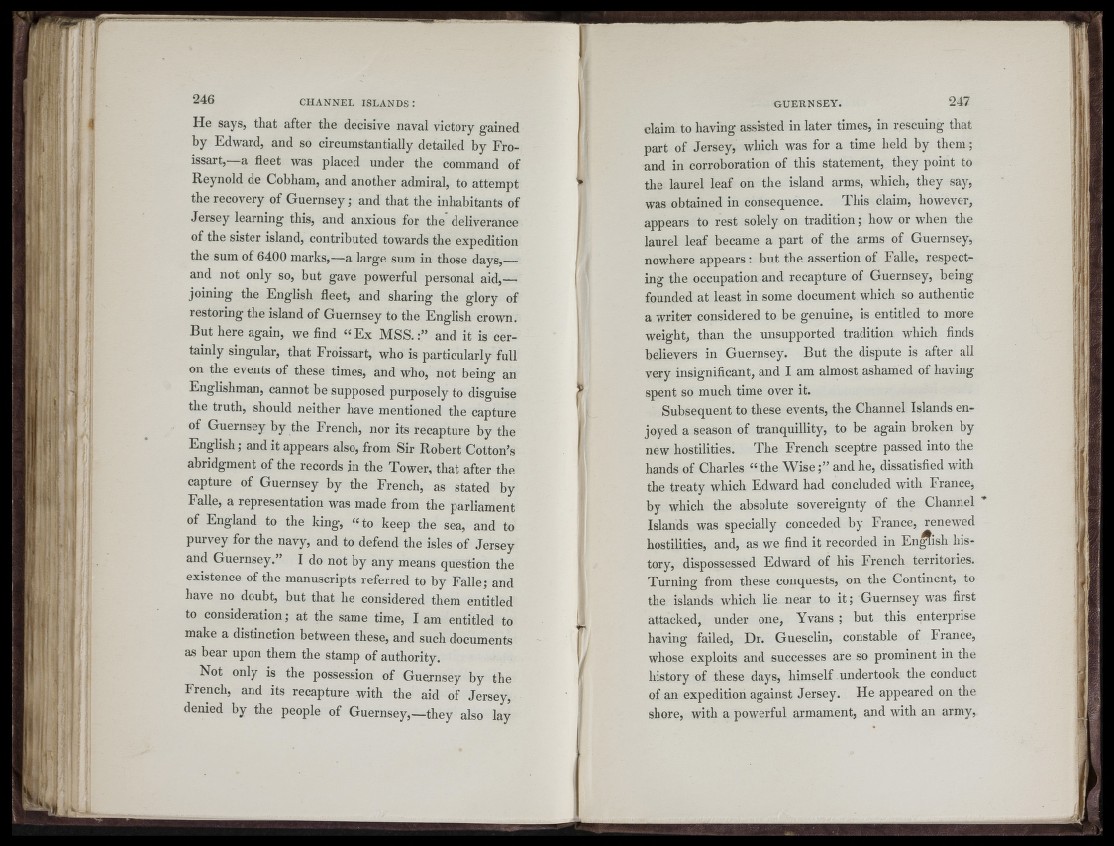
CHANNEL i s l a n d s :
it
He says, that after the decisive naval victory gained
by Edward, and so circumstantially detailed by Froissart,—
a fleet was placed under the command of
Reynold de Cobham, and another admiral, to attempt
the recovery of Guernsey; and that the inhabitants of
Jersey learning this, and anxious for the deliverance
of the sister island, contributed towards the expedition
the sum of 6400 marks,—a large sum in those days,—
and not only so, but gave powerful personal aid,—
joining the English fleet, and sharing the glory of
restoring the island of Guernsey to the English crown.
But here again, we find “ Ex M S S . a n d it is certainly
singular, that Froissart, who is particularly full
on the events of these times, and who, not being an
Englishman, cannot be supposed purposely to disguise
the truth, should neither have mentioned the capture
of Guernsey by the French, nor its recapture by the
English; and it appears also, from Sir Robert Cotton’s
abridgment of the records in the Tower, that after the
capture of Guernsey by the French, as stated by
Falle, a representation was made from the parliament
of England to the king, “ to keep the sea, and to
purvey for the navy, and to defend the isles of Jersey
and Guernsey.” I do not by any means question the
existence of the manuscripts referred to by Falle; and
have no doubt, but that he considered them entitled
to consideration; at the same time, lam entitled to
make a distinction between these, and such documents
as bear upon them the stamp of authority.
Not only is the possession of Guernsey by the
French, and its recapture with the aid of Jersey,
denied by the people of Guernsey,—they also lay
r
claim to having assisted in later times, in rescuing that
part of Jersey, which was for a time held by them;
and in corroboration of this statement, they point to
the laurel leaf on the island arms, which, they say,
was obtained in consequence. This claim, however,
appears to rest solely on tradition; how or when the
laurel leaf became a part of the arms of Guernsey,
nowhere appears: but the assertion of Falle, respecting
the occupation and recapture of Guernsey, being
founded at least in some document which so authentic
a writer considered to be genuine, is entitled to more
weight, than the unsupported tradition which finds
believers in Guernsey. But the dispute is after all
very insignificant, and I am almost ashamed of having
spent so much time over it.
Subsequent to these events, the Channel Islands enjoyed
a season of tranquillity, to be again broken by
new hostilities. The French sceptre passed into the
hands of Charles “ the W is e ;” and he, dissatisfied with
the treaty which Edward had concluded with France,
by which the absolute sovereignty of the Channel
Islands was specially conceded by France, renewed
hostilities, and, as we find it recorded in E n ^ ish history,
dispossessed Edward of his French territories.
Turning from these conquests, on the Continent, to
the islands which lie near to it; Guernsey was first
attacked, under one, Yvans ; but this enterprise
having failed. Dr. Giiesclin, constable of France,
whose exploits and successes are so prominent in the
history of these days, himself undertook the conduct
of an expedition against Jersey. He appeared on the
shore, Avith a powerful armament, and AAUth an army.
5 i>
iI■fDl
S' Iu
'i'
♦ f
i'■iIi'd, i
JIi'--
r ) i
f